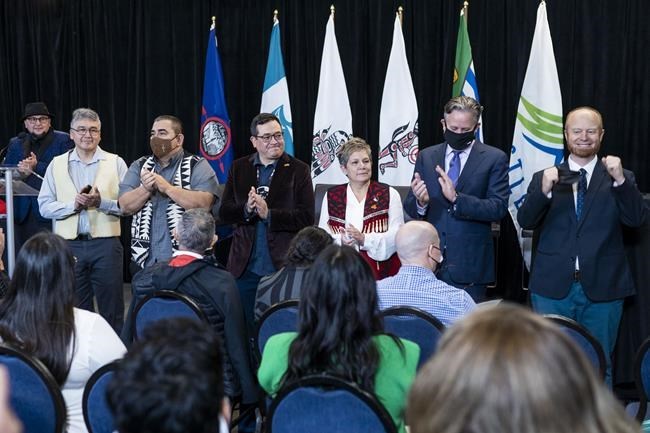VANCOUVER — Four First Nations are looking to bring the Olympics back to B.C. — and make history in the process.
Officials from the Lilwat, Musqueam, Squamish and Tsleil-Waututh Nations joined the mayors of Vancouver and Whistler on Friday to announce a partnership to explore making a bid for the 2030 Winter Olympics.
It would be the first Indigenous led bid for an Olympic Games.
“I think this is a big part of reconciliation, of moving forward," Musqueam Chief Wayne Sparrow told reporters Friday. "It’s going to be so exciting to take this step forward with all of us. And hopefully we can be successful and show a better Games than 2010.”
Vancouver and Whistler hosted the Winter Games in 2010.
“We have been at this place before in the 2010 Olympics where we showcased our presence and our cultures respectively," said Lilwat Chief Dean Nelson. "The difference between 2010 (and 2030) is that we were an invitee and today we are a big part of the exploratory group to explore a bid for the 2030 Olympics.”
Vancouver mayor Kennedy Stewart noted that it is the four First Nations who are leading the potential bid, not the two municipalities.
“Four inviting two, not two inviting four," he said.
"Today is a historic day but there is a long way to go. We are only at the exploratory phase. But no matter what is decided by the Indigenous peoples represented here today, Vancouver will continue to walk this different and unfamiliar path as we continue to put reconciliation into action.”
Any potential bid would still need approval from Vancouver's city council, Stewart said.
The group will now work with the Canadian Olympic Committee and Canadian Paralympic Committee to assess the feasibility of making a bid. Factors that will be considered during the process include costs and benefits for the communities involved.
“This announcement fully aligns with our process and our commitment to the Truth and Reconciliation Commission of Canada’s call to action and is an important first step toward exploring the feasibility of bringing the Olympic and Paralympic Games back to the region," said Tricia Smith, president of the Canadian Olympic Committee.
A decision on whether to submit a formal bid to the International Olympic Committee is expected in the fall of 2022.
"Today we think of the canoe leaving the shore," Stewart said.
The 2010 Games cost about $4 billion, including an expansion of the Sea-to-Sky highway from Vancouver to Whistler. The organizing committee has said the Games broke even financially.
Calgary considered hosting the 2026 Winter Games at an estimated cost of $5.1 billion. The decision went to a public vote in 2018, with 56 per cent of those who voted saying 'no' to putting in a bid.
While costs for the 2030 Games will be discussed during the feasibility study, Stewart said he's talked to both the federal and provincial ministers of sport and heard positive reaction to the bid.
He also noted that much of the infrastructure from the 2010 is still in use today. Which facilities could once again be used to stage Olympic events will be considered during the feasibility study.
Team Canada won 26 medals in 2010 to rank third among countries.
The northern Japanese city of Sapporo is a current front-runner to land the 2030 Games. The International Olympic Committee has not indicated when it will pick a host city.
Aside from 2030, the IOC has selected other Olympic hosts through 2032.
The 2022 Beijing Games will begin Feb. 4. After that it'll be Paris in 2024, Milan-Cortina, Italy in 2026, Los Angeles in 2028 and Brisbane, Australia in 2032.
With files from The Associated Press.
This report by The Canadian Press was first published Dec. 10, 2021.
Gemma Karstens-Smith, The Canadian Press


